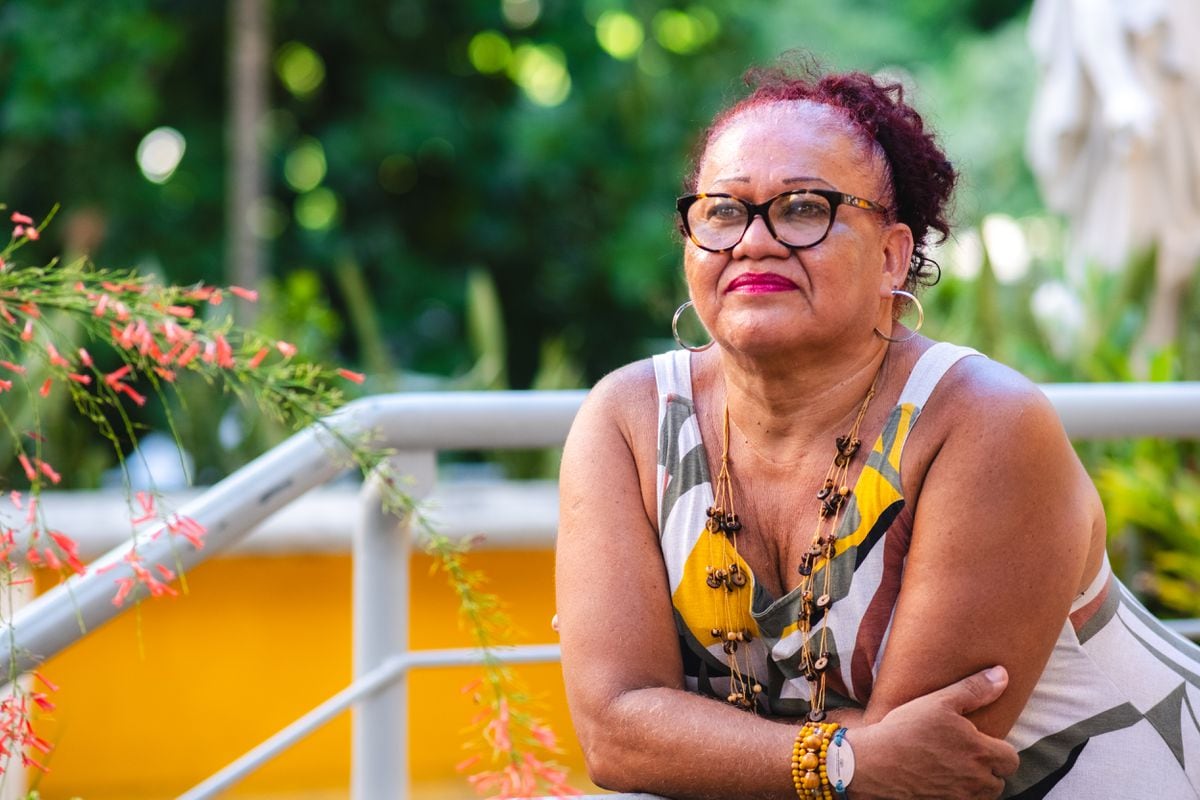Keira Bell last December in front of the Royal Courts of Justice in central London.Sam Tobin / PA
Since Jorge said out loud that he was Jorge, his family has come a long way.
At the age of 13, his chest began to grow and he stopped wanting to go to class.
His longtime friends began to see him as a young woman to flirt with and not as Jorge.
She didn't wear a bikini or want to go to the beach.
They fought to change the name on the DNI.
And for him to start taking testosterone, which was administered to him in private health.
There is a growing number of minors who, like Jorge, go for hormonal treatments to modify their sexual characteristics.
The future trans law in Spain, whose first draft is expected this January, foresees that the decision on these treatments - many times irreversible and involving physical changes - can be made by a transsexual minor from the age of 16.
On the contrary, a judgment handed down by the British Supreme Court considers that minors do not have the capacity to understand its consequences and cannot give their consent.
The debate is already there: there are specialists who defend that these treatments should be prescribed with extensive medical supervision, since they can lead to infertility and affect the development of a full sexual life.
Others understand that each person knows their identity better than anyone else and their word is enough.
Hormone-blocking and cross-hormone treatment for transsexual minors is a recent medical reality.
If you take the blockers at the time when you are about to develop puberty, it will help you to slow down the development of the breasts or the beard and walnut, and with it will stop your anguish and the risk of suffering discrimination by not matching the appearance physical with identity, a damage that sometimes ends in suicide.
That hormonal brake leaves your adolescence on hold for a while.
The next step is the application of cross hormones (testosterone for transsexual boys and estrogens for transsexual girls) in the later years.
There has not yet been enough time to know the long-term effects.
Treatments directed "to the heart of identity"
The case that has sparked controversy in the United Kingdom is that of Keira Bell, 23 years old.
At 14 she began to question her identity, after a childhood in which she felt "grossed out by her body, depressed and very anxious."
He searched YouTube for gender dysphoria [disagreement between assigned sex and the one with which the person identifies].
At 16, he took hormone blockers first and then testosterone.
He ended up having a double mastectomy, an irreversible operation.
He regret.
And he denounced the clinic where he did it, the NHS, the British national health system.
The ruling [which can be consulted at the end of the report, in English] concludes that the consequences of these treatments "are of great complexity" because they are directed "to the heart of an individual's identity."
It warns that the declaration of dysphoria is growing exponentially among minors, especially among adolescent girls who feel like boys, and focuses on the increase in
transitions,
that is, of repentant young people like Bell, although there is no data officials that allow quantifying the phenomenon.
It concludes that a person under the age of 16 does not have the maturity to understand the significance of this decision.
Ultimate consent must come from a judge, the court determines.
The UK has slowed down the passage of a transgender law.
Keira Bell ended up having a double mastectomy, an irreversible operation.
He regret.
And he reported to the clinic where he did it
Spain is doing the opposite route.
This January will see the light of the first draft of the trans law, which has aroused suspicion on the part of the feminist movement.
They warn of the risk that women are "erased" and also of "lack of control" in the cases of minors.
The law will foreseeably state that consent for these treatments can be given from the age of 16, as set out in a proposed law of United We Can from 2017 and claim the organizations that collaborate in the elaboration of the rule.
In Spain, from 16 years of age, consent to medical treatment can be given except in an operation "of serious risk to the life or health of the minor", according to the patient's law.
Presumably, the norm will also reflect that the work of health professionals must be “an accompaniment” like that demanded by families like young Jorge's.
That is, without examinations, psychological or psychiatric tests.
"This is not like ordering a
PlayStation
"
The story of Jorge's life is collected in the book
Transits
.
Her mother says she suffered an anxiety attack and had to take antidepressants.
The sexologist and researcher at the University of the Basque Country Aingeru Mayor, who has “a girl with a penis and another with a vulva”, is the author of this book that collects the cases of 25 minors, narrated by their fathers and mothers.
It is part of the association of transsexual minors Naizen, with 190 families from the Basque Country and Navarra.
There are 2,000 members in different organizations in Spain, according to their estimates.
Families that "have taken months or even years to understand their daughters and sons," explains Mayor over the phone.
When they go to the doctor to ask for a treatment, he adds, they have made a long previous journey: "This is not a frivolity, it is not about asking your mother for hormones like the one that asks for a
PlayStation
."
In the case of transsexual adults, it takes two years according to current regulations to access treatment, something that the new law also seeks to change.
Minors don't always have that time, says Mayor.
“Of course we ask that a medical team accompany this reality.
We are concerned about self-medication, it is not about being put in pharmacies within everyone's reach.
But it is important that whoever accompanies us is not a psychiatrist who believes that our daughters and sons have a mental disorder ”, indicates Mayor:“ Being a minority is not the same as having a pathology ”.
It is important that whoever accompanies us is not a psychiatrist who believes that our daughters and sons have a mental disorder
Aingeru Mayor, researcher and member of the association of families of transsexual minors Naizen
The concept of pathologization is at the center of the debate.
The World Health Organization removed gender dysphoria from the list of psychiatric disorders in 2018.
But there are families and trans activists who consider that the public health services still see them as sick and that they "pathologize" their experiences.
"A serious report is necessary"
"We have not pathologized anything, we have acted with caution from serious teams that take care of and protect", defends the endocrine Isabel Esteva, now retired.
She was the coordinator of the first open transsexuality and gender identity unit in Spain, which began in 1999 at the Regional University Hospital of Malaga.
He defends that removing gender dysphoria from the decalogue of mental illnesses "is a success, but that does not mean removing these treatments from a professional and serious disciplinary environment."
Esteva denounces that the current growth of these cases should not be confused with “extreme transsexuality in childhood, but rather consider the variants of gender expression that occur in these vulnerable ages mediated by networks, to avoid hormonal treatments and hasty medical decision making or negligent ”.
"We have not pathologized anything, we have acted with caution from serious teams that care and protect"
Isabel Esteva, endocrine
"The future law disavows those of us who defend that there is a psychologist by our side and that a serious report is necessary to address these complex treatments," he criticizes.
In a document from the Sexual Identity and Differentiation Group of the Spanish Society of Endocrinology and Nutrition, signed by Esteva with the heads of six other gender units already in 2015, they recommended that, given gender dysphoria in children and adolescents, it is “absolutely necessary ”an“ exhaustive and individualized ”evaluation in specialized medical units before the“ partially or totally irreversible ”consequences of blocking or supplying hormones.
"Who knows his identity is the person himself"
Most of the autonomous communities have their own gender units.
Organizations such as Naizen or Felgtb (the State Federation of Lesbians, Gays, Trans and Bisexuals) denounce a disparate functioning by communities and speak again of "pathologization" on the part of their professionals.
They defend an alternative model like the one that began almost a decade ago in Barcelona due to the efforts of the gynecologist Rosa Almirall: Trànsit.
"If the child and the parents agree and understand the repercussions, we treat in the first visit"
Rosa Almirall, Head of Transit
"If the child and the parents agree and understand the repercussions, we give treatment on the first visit," explains Almirall, head of this unit dependent on the Catalan health service, which deals with cases from primary care.
He began advising trans people in 2012, after listening to those who came to his consultation and told him that they self-hormone to avoid going through a psychiatrist: "This is how I discovered the torture and aggression that they usually live in health services," he explains.
He started it almost as a
hobby
, account by video call.
In just five years since the opening in 2017, the service was overwhelmed.
The health department allowed him to form a team with, among others, two gynecologists, a family doctor and two psychologists.
Three of his collaborators are trans people, one of them a professional psychologist.
They have served 3,880 people in this time.
750 people were from outside Catalonia, to whom he responds and sends prescriptions for treatments, if necessary, by email after requesting analytics from their own health centers.
“The only one who knows who he is and knows his identity is the person himself, no matter how old he is.
You do not need psychological evaluation, or psychiatric, or anything at all.
There is no medical or psychological test to ensure their will, ”he defends.
There are no official data on the so-called
transitions
or regrets, which in Trànsit calculate that they can reach between 5% and 10% of the total cases (of minors and adults) that have followed.
“It doesn't seem like a problem to me, we
retransition
every day.
In this issue there is transphobia.
Conditions are placed on the body changes of trans people that do not occur in other cases ", adds the head of Trànsit, who gives as an example a tubal ligation or when someone marries thinking that it will be for life:" Maybe someone does not feel the male they said he was at birth and has needed a journey with hormones to understand it.
You build yourself as you live ”.
An increase in inquiries above 2,000%
There is no official collection of data on the treatment of transsexual minors in Spain.
The Bell case ruling states that in the United Kingdom, children and young people referred to the gender identity service - who did not necessarily end up receiving treatment - went from 97 in 2009 to 2,519 people in 2018, more than 2,600%.
And that the cases of girls who declare themselves trans boys have increased, especially.
In Trànsit, the unit of attention to trans people of the Catalan Health Service, they have treated 609 minors between nine and 16 years of age since April 2014. The increase is more than 2,200% from the eight cases of the first year to 179 of 2020. There are 407 trans boys, 179 trans girls and 23 with non-binary identity, so there is also a higher increase in the case of those who transition to boys.
For the part of the Spanish feminist movement critical of the future law, this difference in the numbers is a clear reflection of the sexist pressures that women suffer.
From the other side, they attribute it to the fact that society has more difficulty accepting a trans woman without caricaturing her or that until now trans men were more invisible because their physical changes are not so obvious in the eyes of society.








/cloudfront-eu-central-1.images.arcpublishing.com/prisa/MG6G7DJUBNBLRNE2DSTK4WZYTY.jpg)


/cloudfront-eu-central-1.images.arcpublishing.com/prisa/S7ERVSCT4FUVX6R7TUVBDNTH5Y.jpg)



